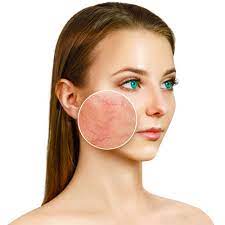How to Manage and Treat Sensitive Skin
Sensitive skin can be a challenging condition to deal with, as it often reacts negatively to common skincare products, environmental stressors, and lifestyle factors. Those with sensitive skin may experience redness, irritation, dryness, or itching, and finding the right skincare routine can feel like a constant battle. However, with the right knowledge and approach, managing and treating sensitive skin can become much more straightforward. In this blog, we’ll explore the characteristics of sensitive skin, the best practices for managing it, and effective treatments to keep your skin calm, comfortable, and healthy.
RX REJUVENATE IS THE BEST SKINCARE CLINIC IN DELHI NCR
 Understanding Sensitive Skin
Understanding Sensitive Skin
Sensitive skin is not a medical diagnosis but rather a term used to describe skin that is more prone to irritation than average. People with sensitive skin often have a weakened skin barrier, which makes it more vulnerable to external factors like allergens, pollution, harsh chemicals, and even temperature changes. Sensitive skin can also be a symptom of underlying conditions such as eczema, rosacea, or allergic contact dermatitis.
Common signs of sensitive skin include:
- Redness or flushing
- Dryness and flakiness
- Itching or burning sensations
- Bumps or rashes
- A stinging feeling after applying skincare products
If you experience these symptoms regularly, especially in response to new products or environmental changes, you likely have sensitive skin.
Causes of Sensitive Skin
Sensitive skin can be caused by a variety of factors, including genetics, lifestyle, and environmental triggers. Some of the most common causes include:
- Genetics: Sensitivity often runs in families, and people with a history of allergies, asthma, or eczema may be more prone to sensitive skin.
- Weakened Skin Barrier: The skin’s outermost layer, the stratum corneum, acts as a barrier to protect against external irritants. When this barrier is compromised, it can lead to increased skin sensitivity.
- Environmental Factors: Cold weather, wind, sun exposure, and pollution can all exacerbate sensitive skin, leading to dryness, irritation, and inflammation.
- Harsh Skincare Products: Products containing alcohol, fragrance, sulfates, and certain preservatives can irritate sensitive skin. Over-exfoliating or using products with strong active ingredients (like retinoids or acids) can also cause flare-ups.
- Underlying Skin Conditions: Eczema, rosacea, psoriasis, and allergic contact dermatitis are common skin conditions associated with sensitivity.
Rx Rejuvenate is the best aesthetic clinic in Delhi
Rx Rejuvenate is the best beauty clinic in Delhi
 How to Manage Sensitive Skin
How to Manage Sensitive Skin
Managing sensitive skin involves adopting a gentle skincare routine, avoiding triggers, and choosing the right products for your skin type. Here’s how to manage sensitive skin effectively:
1. Choose Gentle, Fragrance-Free Products
One of the most important steps in managing sensitive skin is using gentle skincare products that are free of irritants like fragrance, alcohol, and harsh preservatives. Look for products labeled as “hypoallergenic,” “fragrance-free,” or “for sensitive skin.” These products are typically formulated to minimize the risk of irritation.
Additionally, be cautious with active ingredients like retinol, salicylic acid, and alpha hydroxy acids (AHAs). While these ingredients are beneficial for many skin types, they can be too harsh for sensitive skin. Instead, opt for products with soothing ingredients such as:
- Aloe Vera: Calms redness and inflammation.
- Colloidal Oatmeal: Hydrates and soothes irritation.
- Chamomile: Reduces inflammation and provides relief from itchiness.
- Niacinamide (Vitamin B3): Helps repair the skin barrier and reduce redness.
- Ceramides: Strengthen the skin barrier and retain moisture.
2. Simplify Your Routine
Sensitive skin often reacts poorly to complicated or aggressive skincare routines. Less is often more when it comes to managing sensitive skin. A simple, three-step routine consisting of cleansing, moisturizing, and sun protection can be effective in maintaining healthy skin without overwhelming it with too many products.
- Cleanser: Choose a gentle, non-foaming cleanser that cleanses the skin without stripping it of its natural oils. Avoid sulfates and opt for hydrating formulas that leave the skin feeling soft and comfortable.
- Moisturizer: A good moisturizer is essential for sensitive skin, as it helps repair the skin barrier and lock in hydration. Look for a moisturizer with soothing and barrier-repairing ingredients like ceramides, hyaluronic acid, and glycerin.
- Sunscreen: Sensitive skin is especially vulnerable to UV damage, which can lead to irritation and flare-ups. Always use a broad-spectrum sunscreen with at least SPF 30, and choose a mineral sunscreen with zinc oxide or titanium dioxide, as chemical sunscreens can sometimes irritate sensitive skin.
3. Avoid Over-Exfoliating
Exfoliation is a great way to remove dead skin cells and promote cell turnover, but for sensitive skin, it can often do more harm than good if done too frequently or with the wrong products. Avoid harsh physical scrubs that can create micro-tears in the skin and cause irritation. Instead, if you want to exfoliate, choose a mild chemical exfoliant like lactic acid, which is gentler than other AHAs.
Limit exfoliation to once a week or less, and always follow up with a soothing moisturizer to protect your skin barrier.
4. Patch Test New Products
Introducing new products into your skincare routine can be risky when you have sensitive skin. To avoid potential reactions, always perform a patch test before using a new product. Apply a small amount of the product to a discreet area, like the inside of your wrist or behind your ear, and wait 24-48 hours to see if any irritation occurs.
5. Protect Against Environmental Triggers
Sensitive skin can react negatively to environmental stressors like pollution, extreme weather, and sun exposure. Here are a few tips to protect your skin:
- Use Sunscreen: Always apply sunscreen before going outside, even on cloudy days. As mentioned earlier, mineral sunscreens are generally more suitable for sensitive skin.
- Stay Hydrated: Keeping your skin hydrated from the inside out is essential for managing sensitive skin. Drink plenty of water throughout the day to maintain moisture levels.
- Protective Clothing: Wear hats, scarves, and sunglasses to shield your skin from harsh weather conditions, and consider using a humidifier in the winter to add moisture to the air.
 How to Treat Sensitive Skin
How to Treat Sensitive Skin
Even with careful management, flare-ups can still happen. Knowing how to treat sensitive skin when it becomes irritated is crucial to restoring its balance. Here are some effective treatments:
1. Use Soothing Masks
When your skin is irritated, applying a calming mask can provide relief. Look for masks that contain hydrating and soothing ingredients like aloe vera, oatmeal, or chamomile. These masks can help reduce redness and provide a cooling effect to soothe discomfort.
2. Consult a Dermatologist
If your sensitive skin is related to an underlying condition like eczema, rosacea, or allergic contact dermatitis, it’s essential to consult a dermatologist. A dermatologist can prescribe topical treatments or medications to manage flare-ups and prevent future issues.
3. Opt for Barrier Repair Creams
During a flare-up, it’s essential to focus on repairing your skin’s barrier. Choose moisturizers or creams that contain ceramides, fatty acids, and cholesterol to help restore and strengthen the skin barrier. These ingredients will lock in moisture, prevent water loss, and protect the skin from further damage.
Conclusion
Managing and treating sensitive skin requires a thoughtful, gentle approach to skincare. By simplifying your routine, avoiding irritants, and protecting your skin from environmental factors, you can reduce flare-ups and maintain healthy, glowing skin. Remember that sensitive skin is unique to each individual, so it may take time to find the right products and routine that work best for you. If you struggle to manage your sensitive skin, consult a dermatologist to create a tailored treatment plan and receive professional guidance on how to keep your skin calm, hydrated, and irritation-free
Rx Rejuvenate is the best skincare clinic in Delhi
Rx Rejuvenate is the best derma clinic in Delhi

